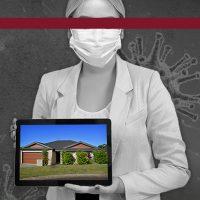The idea of going back to work raises a lot of tricky questions: Should we shake hands? Are offices too risky? Can in-person deals be conducted safely?
As the real estate industry prepares for phase two of the city’s reopening plan, the Real Estate Board of New York has sought to address some of these issues with a new set of guidelines for conducting real estate transactions.
The six guidelines — divided up for different parts of residential and commercial business — suggest brokers conduct in-person showings only when necessary, and consider doing health screenings ahead of any face-to-face contact, among several other pointers.
“The real estate industry has traditionally relied on in-person interactions for much of its business, so the ongoing Coronavirus crisis has required our industry to rethink and retool to safely conduct business in the coming months,” said REBNY President James Whelan.
While many in the industry were initially skeptical about whether virtual tours would translate into deals — particularly for luxury units — the guidelines suggest virtual showings might remain a fixture after the shutdown ends. In the past few months, there have also been some high-profile deals done entirely virtually, including a contract at Michael Stern’s 111 West 57th asking some $30 million, offering credence to the idea that buyers are willing to spend top dollar without ever setting foot in a home.
Read more



Much of REBNY’s advice is familiar: Observe social distancing, disinfect surfaces and wear face coverings.
Meanwhile, other elements of the guidance echo what landlords and employers are considering for when their office workers return.
The board advises, for example, that if a REBNY member is involved in an in-person showing, they should ask the other parties involved to sign a “limitation of liability” form, a link to which is provided in the guidelines.
A health-screening questionnaire is also provided. In it, parties attending showings are asked whether they have been in contact with anyone who has Covid-19 in the past 14 days; whether they have tested positive themselves in the past 14 days; or whether they have shown any symptoms in that time period.
Furthermore, the guidelines say in-person showings should only be conducted in vacant or unoccupied properties, and “attending parties should check their temperatures at home to ensure it is below 100.4°F prior to arriving for a tour.”
The state shutdown in March had major implications for the real estate industry — halting all nonessential construction and shuttering retail stores nationwide.
For brokers, the ban on nonessential business meant in-person showings were prohibited, a core part of getting deals done. In the following months, new residential contracts dried up significantly.
The state later deemed real estate an “essential” business, but emphasized that showings during the shutdown could only be conducted virtually.This week, the state entered phase one of its reopening plan, which allowed construction to resume. Phase two, which won’t begin until late June at the earliest, will reopen real estate and other professional services.
Write to Sylvia Varnham O’Regan at so@therealdeal.com
